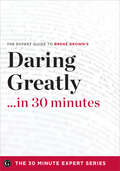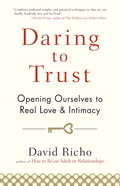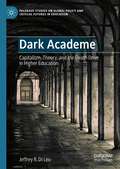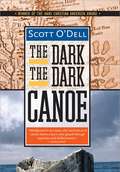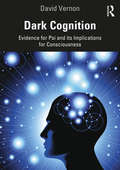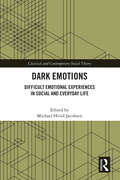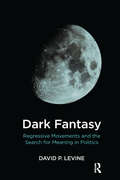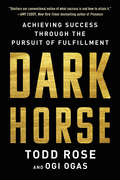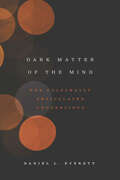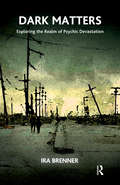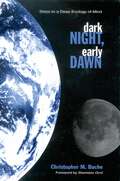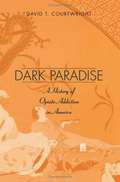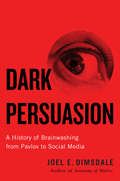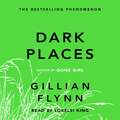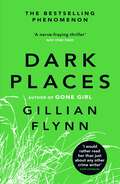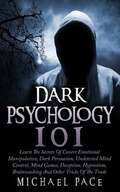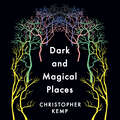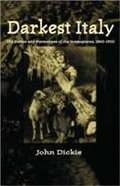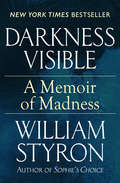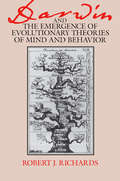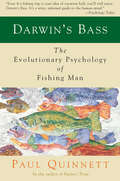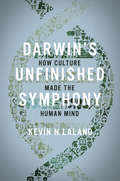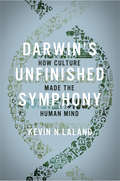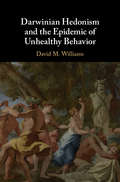- Table View
- List View
Daring Greatly in 30 Minutes: The Expert Guide to Brene Brown's Critically Acclaimed Book
by Garamond PressDaring Greatly ...in 30 minutes is the essential guide to quickly understanding the life-changing lessons outlined in Brené Brown's best-selling book, Daring Greatly: How the Courage to Be Vulnerable Transforms the Way We Live, Love, Parent, and Lead. In Daring Greatly, Brené Brown argues that by learning to be vulnerable, people can find deeper connections with the people around them and improve their relationships. Daring Greatly aims to prove that vulnerability is not a negative trait, but that we should have the courage to embrace imperfections if we want to be content and live a more fulfilling life. Daring Greatly posits that if people can learn to practice vulnerability, they can find deeper connections in their relationships—and, perhaps most important, they can establish compassionate and loving relationships with themselves. Understand the key ideas of Daring Greatly in a fraction of the time, with tools such as: Concise synopsis, which examines the principles of Daring Greatly In-depth analysis of key concepts from Daring Greatly, including an explanation of the "Wholehearted," shame resilience, and embracing vulnerability Insightful background on thought leader Brené Brown and the origins of Daring Greatly Key takeaways for utilizing Brown's theories to live a worthy, connected, and authentic life Extensive recommended reading list and bibliography relevant to Daring Greatly As with all books in the 30 Minute Expert Series, this book is intended to be purchased alongside the reviewed title, Daring Greatly: How the Courage to Be Vulnerable Transforms the Way We Live, Love, Parent, and Lead.
Daring to Trust: Opening Ourselves to Real Love and Intimacy
by David RichoMost relationship problems are essentially trust issues, explains psychotherapist David Richo. Whether it's fear of commitment, insecurity, jealousy, or a tendency to be controlling, the real obstacle is a fundamental lack of trust--both in ourselves and in our partner.Daring to Trust offers key insights and practical exercises for exploring and addressing our trust issues in relationships. Topics include: * How we learn early in life to trust others (or not to trust them) * Why we fear trusting * Developing greater trust in ourselves as the basis for trusting others * How to know if someone is trustworthy * Naïve trust vs. healthy, adult trust * What to do when trust is brokenUltimately, Richo explains, we must develop trust in four directions: toward ourselves, toward others, toward life as it is, and toward a higher power or spiritual path. These four types of trust are not only the basis of healthy relationships, they are also the foundation of emotional well-being and freedom from fear.
Dark Academe: Capitalism, Theory, and the Death Drive in Higher Education (Palgrave Studies on Global Policy and Critical Futures in Education)
by Jeffrey R. Di LeoThis book argues that a critical understanding of dark academe is vital to the futures of democracy and education. Drawing upon contemporary literary and cultural theory, particularly, affect theory, queer epistemology, and critical race theory as well as critiques of capitalism and accounts of the death drive, it builds a case for identifying dark academe as anything that prohibits the pursuit of democratic education and critical citizenship. It also argues that dark times require a reassessment of the ways theory and knowledge are approached in the humanities. This is necessary if the aim is to truly understand the darkness at the heart of the higher education today. Dark academe works to negate education and learning by continuously telling us that the quest for knowledge is empty, and the pursuit of critique is blind. In this educational darkness, the death drive of neoliberal academe becomes a force that works against intellectual transformation and the deepening of critical sights.
Dark Canoe
by Scott O'DellTHERE IS A THIN LINE BETWEEN GENIUS AND MADNESS. When young Nathan sails with his older brothers in search of a lost treasure ship, he is expected to do exactly as they tell him. But when one of his brothers mysteriously dies and the other declares he is Captain Ahab straight out of Moby Dick, Nathan worries about what orders he might have to carry out. Then a mysterious object appears in the bay that seems to have floated out of the very pages of Moby Dick. Something very strange is happening at sea, but how. . . and why? "Figures and events from Moby Dick are given eerie, shadowy counterparts ... So quietly, so persuasively is this accomplished that when Ishmael's ocean-going coffin drifts out of Melville's seas in O'Dell's, it carries no shock for either Nathan or the reader." Washington Post Book World.
Dark Cognition: Evidence for Psi and its Implications for Consciousness
by David VernonOutlining the scientific evidence behind psi research, Dark Cognition expertly reveals that such anomalous phenomena clearly exist, highlighting that the prevailing view of consciousness, purely as a phenomenon of the brain, fails to account for the empirical findings. David Vernon provides essential coverage of information and evidence for a variety of anomalous psi phenomena, calling for a paradigm shift in how we view consciousness: from seeing it as something solely reliant on the brain to something that is enigmatic, fundamental and all pervasive. The book examines the nature of psi research showing that, despite claims to the contrary, it is clearly a scientific endeavour. It explores evidence from telepathy and scopaesthesia, clairvoyance and remote viewing, precognition, psychokinesis, fields of consciousness, energy healing, out of body experiences, near-death experiences and post death phenomena, showing that not only do these phenomena exist, but that they have significant implications for our understanding of consciousness. Featuring discussion on scientific research methods, reflections on the fields of dark cognition and end-of-chapter questions that encourage critical thinking, this book is an essential text for those interested in parapsychology, consciousness and cognitive psychology.
Dark Emotions: Difficult Emotional Experiences in Social and Everyday Life (ISSN)
by Michael Hviid JacobsenDark Emotions is a book about a range of emotional experiences that are often regarded or characterized as ‘negative’, ‘disturbing’ or ‘dark’ as contrasted with emotions that are ‘positive’, ‘pleasant’ or ‘light’.Each chapter in the book is devoted to introducing different ‘dark emotions’ such as disappointment, betrayal, worry, regret, resentment and alienation and seeks to show – through conceptual, theoretical and empirical examples – how these emotions influence peoples’ lives and their relations to self, others and society. The book thus provides an overview of some dark emotions that are recognizable in our everyday lives and culture. It contains accessible introductions and relevant theoretical and empirical research on 12 different kinds of ‘dark emotions’. The chapters are highly useful for teaching sessions and research contexts. Additionally, they provide extensive lists of references for further reading.The book will be particularly useful for students or scholars with an interest in emotion research or related areas, and the book may inspire further investigation of the often- overlooked emotions presented in this volume.
Dark Fantasy: Regressive Movements and the Search for Meaning in Politics
by David P. LevineRecent trends in politics culminating in the US with the election of Donald Trump both provoked and expressed a troubling intensification of emotion in the body politic. Heightened levels of anger, frustration, and distrust, the dismissal of the norms of politics and policy making, and the prevalence of intractable conflict indicated an increase in the power of regressive forces. The power of these forces takes the form of dark fantasies involving the loss, indeed the destruction, of safe space, the prevalence of existential threat, and the corrosion of the kinds of relationships that make living in the world tolerable. This book explores the emotional meaning of regressive movements in contemporary politics with special reference to Trump and his supporters. Its main hypothesis is that the primary goal of these movements is not to restore a lost world of safety and wellbeing as they claim it is, but to make their members' experience of the destruction and loss of that world universal.
Dark Horse: Achieving Success Through the Pursuit of Fulfillment
by Ogi Ogas Todd RoseFor generations, we've been stuck with a cookie-cutter mold for success that requires us to be the same as everyone else, only better. This "standard formula" works for some people but leaves most of us feeling disengaged and frustrated. As much as we might dislike the standard formula, it seems like there's no other practical path to financial security and a fulfilling life. But what if there is? In the Dark Horse Project at the Harvard Graduate School of Education, bestselling author and acclaimed thought leader Todd Rose and neuroscientist Ogi Ogas studied women and men who achieved impressive success even though nobody saw them coming. Dark horses blaze their own trail to a life of happiness and prosperity. Yet what is so remarkable is that hidden inside their seemingly one-of-a-kind journeys are practical principles for achieving success that work for anyone, no matter who you are or what you hope to achieve. This mold-breaking approach doesn't depend on you SAT scores, who you know, or how much money you have. The secret is a mindset that can be expressed in plain English: Harness your individuality in the pursuit of fulfillment to achieve excellence. In Dark Horse, Rose and Ogas show how the four elements of the dark horse mindset empower you to consistently make the right choices that fit your unique interests, abilities, and circumstances and will guide you to a life of passion, purpose, and achievement.
Dark Matter of the Mind: The Culturally Articulated Unconscious
by Daniel L. EverettIs it in our nature to be altruistic, or evil, to make art, use tools, or create language? Is it in our nature to think in any particular way? For Daniel L. Everett, the answer is a resounding no: it isn't in our nature to do any of these things because human nature does not exist--at least not as we usually think of it. Flying in the face of major trends in Evolutionary Psychology and related fields, he offers a provocative and compelling argument in this book that the only thing humans are hardwired for is freedom: freedom from evolutionary instinct and freedom to adapt to a variety of environmental and cultural contexts. Everett sketches a blank-slate picture of human cognition that focuses not on what is in the mind but, rather, what the mind is in--namely, culture. He draws on years of field research among the Amazonian people of the Pirahã in order to carefully scrutinize various theories of cognitive instinct, including Noam Chomsky's foundational concept of universal grammar, Freud's notions of unconscious forces, Adolf Bastian's psychic unity of mankind, and works on massive modularity by evolutionary psychologists such as Leda Cosmides, John Tooby, Jerry Fodor, and Steven Pinker. Illuminating unique characteristics of the Pirahã language, he demonstrates just how differently various cultures can make us think and how vital culture is to our cognitive flexibility. Outlining the ways culture and individual psychology operate symbiotically, he posits a Buddhist-like conception of the cultural self as a set of experiences united by various apperceptions, episodic memories, ranked values, knowledge structures, and social roles--and not, in any shape or form, biological instinct. The result is fascinating portrait of the "dark matter of the mind," one that shows that our greatest evolutionary adaptation is adaptability itself.
Dark Matters: Exploring the Realm of Psychic Devastation
by Ira BrennerThis book takes a deeper look into the darker side of the human condition by examining the psyches of those who have been victims or survivors of heinous acts perpetrated by others. From the "personal Holocaust" of sexual abuse in the family, to the genocidal persecution during "the" Holocaust, and from the shared national horror of September 11 to the Palestinian/Israeli situation, a special model of the traumatized mind is evolved to further our understanding of such "dark matters". The traditional models of the mind fall short when dealing with extraordinary people under ordinary conditions as well as with ordinary people under extraordinary conditions. This metapsychology is organized around the defensive operations of repression or splitting. In the model proposed here, defensive altered states of consciousness, or dissociation seems more helpful. A historical perspective is offered, from Freud and Breuer, with their Studies on Hysteria, to current thinking about dissociative disorders. A developmental line of dissociation is also explored.
Dark Night, Early Dawn: Steps to a Deep Ecology of Mind (SUNY series in Transpersonal and Humanistic Psychology)
by Christopher M. BacheArgues that philosophical reflection today must include the findings of depth psychology and the critical study of non-ordinary states of consciousness.Combining philosophical reflections with deep self-exploration to delve into the ancient mystery of death and rebirth, this book emphasizes collective rather than individual transformation. Drawing upon twenty years of experience working with nonordinary states, Bache argues that when the deep psyche is hyper-stimulated using Stanislav Grof's powerful therapeutic methods, the healing that results sometimes extends beyond the individual to the collective unconscious of humanity itself.Dark Night, Early Dawn is the most important book I have read in recent years. Whenever I present a brief summary of its major ideas, either to students in my graduate classes or to general audiences, it unfailingly arouses intense interest. I believe Bache's work evokes this response because he has articulated, with superb clarity, rigor, and depth of insight, a radically expanded perspective on the deeper nature of individual human experience, a perspective that many have been gradually intuiting but had not yet been able clearly to formulate."With moving honesty and a rare lack of inflation, Bache has brought forth a conception of the human psyche that intimately reconnects the personal ordeals and awakenings of the individual to the larger collective suffering and spiritual transformation of the entire human species, at this most crucial of historical thresholds. This is a book to read soon and to integrate carefully." -- Richard Tarnas, author of The Passion of the Western Mind: Understanding the Ideas That Have Shaped Our World View"This very important contribution to transpersonal psychology, I know very few books that represent such a unique balance of critical thinking and deep personal experience. The author's extensive knowledge of philosophical, religious, and psychological literature makes it possible for him to provide solid grounding for the profound insights from his nonordinary states of consciousness. Brings unusual clarity into several important problem areas and represents an important step toward an integration and synthesis of the observations and experiences involved. Christopher Bache is one of the most creative and imaginative thinkers in the transpersonal field." -- Stanislav Grof, author of The Cosmic Game: Explorations of the Frontiers of Human Consciousness and Beyond the Brain: Birth, Death, and Transcendence in PsychotherapyChristopher M. Bache is Professor of Religious Studies in the Department of Philosophy and Religious Studies at Youngstown State University. He is the author of Lifecycles: Reincarnation and the Web of Life.
Dark Paradise: A History of Opiate Addiction in America
by David T. CourtwrightDavid T. Courtwright offers an original interpretation of a puzzling chapter in American social and medical history: the dramatic change in the pattern of opiate addiction--from respectable upper-class matrons to lower-class urban males, often with a criminal record. Dark Paradise tells the story not only from the standpoint of legal and medical sources, but also from the perspective of addicts themselves.
Dark Persuasion: A History of Brainwashing from Pavlov to Social Media
by Joel E. DimsdaleA harrowing account of brainwashing&’s pervasive role in the twentieth and twenty-first centuries This gripping book traces the evolution of brainwashing from its beginnings in torture and religious conversion into the age of neuroscience and social media. When Pavlov introduced scientific approaches, his research was enthusiastically supported by Lenin and Stalin, setting the stage for major breakthroughs in tools for social, political, and religious control. Tracing these developments through many of the past century&’s major conflagrations, Dimsdale narrates how when World War II erupted, governments secretly raced to develop drugs for interrogation. Brainwashing returned to the spotlight during the Cold War in the hands of the North Koreans and Chinese. In response, a huge Manhattan Project of the Mind was established to study memory obliteration, indoctrination during sleep, and hallucinogens. Cults used the techniques as well. Nobel laureates, university academics, intelligence operatives, criminals, and clerics all populate this shattering and dark story—one that hasn&’t yet ended.
Dark Places: The New York Times bestselling phenomenon from the author of Gone Girl
by Gillian FlynnYour brother murdered your family. Your evidence put him away . . . the gripping second novel from the author of GONE GIRL and SHARP OBJECTSLibby Day was just seven years old when her older brother massacred her family while she hid in a cupboard. Her evidence helped put him away. Ever since then she has been drifting, surviving for over 20 years on the proceeds of the 'Libby Day fund'. But now the money is running out and Libby is desperate. When she is offered $500 to do a guest appearance, she feels she has to accept. But this is no ordinary gathering. The Kill Club is a group of true-crime obsessives who share information on notorious murders, and they think her brother Ben is innocent. Ben was a social misfit, ground down by the small-town farming community in which he lived. But he did have a girlfriend - a brooding heavy metal fan called Diondra. Through her, Ben became involved with drugs and the dark arts. When the town suddenly turned against him, his thoughts turned black. But was he capable of murder? Libby must delve into her family's past to uncover the truth - no matter how painful...
Dark Places: The New York Times bestselling phenomenon from the author of Gone Girl
by Gillian FlynnTHE BESTSELLING PHENOMENON 'Eerily macabre... Wonderful' Guardian'A nerve-fraying thriller' New York Times'Every bit as horribly fascinating as In Cold Blood' Daily MailLibby Day was seven when her family was murdered: she survived by hiding in a closet - and famously testified that her older brother Ben was the killer. Twenty-five years later the Kill Club - a secret society obsessed with notorious crimes - gets in touch with Libby to try to discover proof that may free Ben. Almost broke, Libby agrees to go back to her hometown to investigate - for a fee. But when Libby's search uncovers an unimaginable truth, she finds herself right back where she started: on the run from a killer. THE ORIGINAL #1 BESTSELLER, BY THE AUTHOR OF GONE GIRL 'I would rather read her than just about any other crime writer' Kate Atkinson'Gillian Flynn is the real deal: a sharp, acerbic and compelling storyteller' Stephen King'An extraordinarily good writer' Observer
Dark Psychology 101: Learn the Secrets of Covert Emotional Manipulation, Dark Persuasion, Undetected Mind Control, Mind Games, Deception, Hypnotism, Brainwashing and Other Tricks of the Trade
by Michael PaceDark psychology is one of the most powerful forces at work in the world today. It is used by the most powerful influencers the world has ever known. Those who are unaware of it risk having it used against them. Don't run that risk! <p><p>In his book entitled Dark Psychology 101, author Michael Pace offers a cutting-edge distillation of some of the most powerful principles in the world of dark psychology. Each chapter explains an aspect of dark psychology in a way which is understandable for a layman with no specialist scientific knowledge. Ideas are illustrated with examples to make the task of understanding dark psychology easier. In addition, the book contains case studies and useful profiles on the types of people who make use of this "black magic" in their everyday lives. You will be also shown how you can apply the principles of dark psychology if you choose to. <P><p>Please be warned, this book is not for the faint of heart or the weak of mind. Once you have lifted the curtain on the world of dark psychology, there is no going back. You will have an understanding of human nature that few have ever obtained. With great power comes great responsibility.
Dark and Magical Places: The Neuroscience of How We Navigate
by Christopher Kemp"A NATURAL STORYTELLER" Mary Roach"BRILLIANT AND BEGUILING" Matthew Gavin Frank"CAPTIVATING ... WILL ALTER THE WAY YOU SEE AND MOVE THROUGH THE WORLD" M. R. O'ConnorWithin our heads, we carry around an infinite and endlessly unfolding map of the world. Navigation is one of the most ancient neural abilities we have - older even than language - and in Dark and Magical Places, Christopher Kemp embarks on a journey to discover the remarkable extent of what our minds can do.From the secrets of supernavigators to the strange, dreamlike environments inhabited by people with 'place blindness', he will explore the myriad ways in which we find our way. Kemp explains the cutting-edge neuroscience that is transforming our understanding of it - and tries to answer why, for a species with a highly-sophisticatedinternal navigation system that evolved over millions of years, do humans get lost such a lot?"I WAS THRILLED TO DISCOVER THIS BOOK" Robert Moor
Darkest Italy: The Nation and Stereotypes of the Mezzogiorno, 1860-1900
by John Dickie<p>Stereotypical representations of the Mezzogiorno are a persistent feature of Italian culture at all levels. In Darkest Italy, John Dickie analyzes these stereotypes in the post-Unification period, when the Mezzogiorno was widely seen as barbaric, violent or irrational, an "Africa" on the European continent. At the same time, this is the moment when the Mezzogiorno became a metaphor for the state of the country as a whole, the index of Italy’s modernity. <p>Dickie argues that these stereotypes, rather than being a symptom of the failings of national identity in Italy, were actually integral to the way Italy’s bourgeoisie imagined themselves as Italian. Drawing on recent theories of Otherness and national identity, Dickie brings a new light to an important and well-established area of Italian history--the relationship between the South and the nation as a whole.</p>
Darkness Visible: A Memoir of Madness (Modern Library 100 Best Nonfiction Bks.)
by William StyronThe New York Times–bestselling memoir of crippling depression and the struggle for recovery by the Pulitzer Prize–winning author of Sophie&’s Choice.In the summer of 1985, William Styron became numbed by disaffection, apathy, and despair, unable to speak or walk while caught in the grip of advanced depression. His struggle with the disease culminated in a wave of obsession that nearly drove him to suicide, leading him to seek hospitalization before the dark tide engulfed him. Darkness Visible tells the story of Styron&’s recovery, laying bare the harrowing realities of clinical depression and chronicling his triumph over the disease that had claimed so many great writers before him. His final words are a call for hope to all who suffer from mental illness that it is possible to emerge from even the deepest abyss of despair and &“once again behold the stars.&” This ebook features a new illustrated biography of William Styron, including original letters, rare photos, and never-before-seen documents from the Styron family and the Duke University Archives.
Darwin and the Emergence of Evolutionary Theories of Mind and Behavior
by Robert J. Richards edited by David L. HullWith insight and wit, Robert J. Richards focuses on the development of evolutionary theories of mind and behavior from their first distinct appearance in the eighteenth century to their controversial state today. Particularly important in the nineteenth century were Charles Darwin's ideas about instinct, reason, and morality, which Richards considers against the background of Darwin's personality, training, scientific and cultural concerns, and intellectual community. Many critics have argued that the Darwinian revolution stripped nature of moral purpose and ethically neutered the human animal. Richards contends, however, that Darwin, Herbert Spencer, and their disciples attempted to reanimate moral life, believing that the evolutionary process gave heart to unselfish, altruistic behavior. "Richards's book is now the obvious introduction to the history of ideas about mind and behavior in the nineteenth century. "—Mark Ridley, Times Literary Supplement "Not since the publication of Michael Ghiselin's The Triumph of the Darwinian Method has there been such an ambitious, challenging, and methodologically self-conscious interpretation of the rise and development and evolutionary theories and Darwin's role therein. "—John C. Greene, Science "His book . . . triumphantly achieves the goal of all great scholarship: it not only informs us, but shows us why becoming thus informed is essential to understanding our own issues and projects. "—Daniel C. Dennett, Philosophy of Science
Darwin's Bass: The Evolutionary Psychology of Fishing Man
by Paul QuinnettThe renowned psychologist, devoted fisherman, and author of Pavlov’s Trout returns with a “witty, informal guide to the human mind” (Psychology Today).In this follow-up to his widely acclaimed Pavlov's Trout, Paul Quinnett, Ph.D., explores the evolutionary foundations of fishing and why so many people have such a strong bond to the sport. Referencing Charles Darwin's Origin of the Species, Quinnett examines how people have evolved, and in some ways “de-evolved”, from our fishing and evolutionary partner the black bass. Throughout Darwin's Bass, Quinnett uses a variety of fishing situations to examine man's place in the evolutionary universe. The book is also a field guide to a better life, as Quinnett offers clinical advice on how to live longer, happier, and healthier by fishing often and hard.
Darwin's Unfinished Symphony: How Culture Made the Human Mind
by Kevin N. LalandHumans possess an extraordinary capacity for cultural production, from the arts and language to science and technology. How did the human mind—and the uniquely human ability to devise and transmit culture—evolve from its roots in animal behavior? Darwin's Unfinished Symphony presents a captivating new theory of human cognitive evolution. This compelling and accessible book reveals how culture is not just the magnificent end product of an evolutionary process that produced a species unlike all others—it is also the key driving force behind that process.Kevin Laland shows how the learned and socially transmitted activities of our ancestors shaped our intellects through accelerating cycles of evolutionary feedback. The truly unique characteristics of our species—such as our intelligence, language, teaching, and cooperation—are not adaptive responses to predators, disease, or other external conditions. Rather, humans are creatures of their own making. Drawing on his own groundbreaking research, and bringing it to life with vivid natural history, Laland explains how animals imitate, innovate, and have remarkable traditions of their own. He traces our rise from scavenger apes in prehistory to modern humans able to design iPhones, dance the tango, and send astronauts into space.This book tells the story of the painstaking fieldwork, the key experiments, the false leads, and the stunning scientific breakthroughs that led to this new understanding of how culture transformed human evolution. It is the story of how Darwin's intellectual descendants picked up where he left off and took up the challenge of providing a scientific account of the evolution of the human mind.
Darwin's Unfinished Symphony: How Culture Made the Human Mind
by Kevin N. LalandHumans possess an extraordinary capacity for culture, from the arts and language to science and technology. But how did the human mind—and the uniquely human ability to devise and transmit culture—evolve from its roots in animal behavior? Darwin’s Unfinished Symphony presents a captivating new theory of human cognitive evolution. This compelling and accessible book reveals how culture is not just the magnificent end product of an evolutionary process that produced a species unlike all others—it is also the key driving force behind that process. Kevin Laland tells the story of the painstaking fieldwork, the key experiments, the false leads, and the stunning scientific breakthroughs that led to this new understanding of how culture transformed human evolution. It is the story of how Darwin’s intellectual descendants picked up where he left off and took up the challenge of providing a scientific account of the evolution of the human mind.
Darwinian Hedonism and the Epidemic of Unhealthy Behavior
by David M. WilliamsPsychological hedonism - the idea that people tend to act in ways that maximize pleasure and minimize displeasure - has a decidedly poor reputation among academics who study human behavior. Opinions range from outright rejection to those who believe it to be intuitively obvious, but untestable and therefore unhelpful. In this book, the author introduces an empirically testable and useful theory of psychological hedonism based on contemporary theory and research in the emerging field of affective neuroscience. He goes on to argue that people are genetically endowed with a tendency towards psychological hedonism as a function of Darwinian processes. This view of psychological hedonism in light of its Darwinian origins - thereinafter referred to as Darwinian hedonism - is essential to address the growing global epidemic of unhealthy behavior, such as poor diet, physical inactivity, and substance use.
Das 1 x 1 der Präsentation: Für Schule, Studium und Beruf
by Karl-Christof RenzDieses Buch zeigt auf unterhaltsame Weise auch dem bisher Unerfahrenen, wie eine Präsentation pragmatisch vorbereitet und mit medialer Unterstützung durchgeführt werden kann. Behandelt werden graphische Gestaltung, Lern- und Arbeitstechniken sowie Gesprächsführung und Rhetorik. Berücksichtigt werden dabei Aspekte der Disziplinen Arbeitswissenschaft und Psychologie. Aber auch Kenntnisse wissenschaftlichen Arbeitens, z. B. Quellensuche, Quellenbewertung und Zitieren, sowie statistische Grundkenntnisse gehören zu einer Präsentation, insbesondere in wissenschaftlichen Bereichen. Die Fähigkeit, professionell zu präsentieren, ist nicht nur in der Praxis, sondern auch in der Wissenschaft grundlegend. Der Autor ist überzeugt: Mit dem richtigen Handwerkszeug kann jeder lernen zu präsentieren - und das kann sogar Spaß machen. Die zweite Auflage wurde überarbeitet und erweitert.
